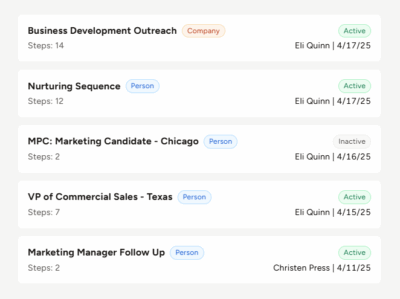Okay, let’s get one thing straight right way. Recruiting IS a sales profession. So it’s not so much recruitment vs. sales as it is recruitment = sales.
In fact, not only is recruiting a sales profession, it is quite possibly the most difficult sales profession that exists. There is a simple reason why this is the case: because there’s a human being on both sides of the sale!
Think about it. Let’s say you’re a salesperson and you’re selling cars. When you successfully convince somebody to buy a car from you, the car can’t derail the whole deal by claiming that they don’t want to be sold. Or that they do want to be sold, but they want somebody else to buy them instead.
However, that is absolutely the case in recruitment. With people on both sides of the sale, there are literally twice as many objections to overcome. That’s because there are twice as many people providing objections . . . at least! (You didn’t forget about the candidate’s spouse, did you? For shame!)
If you’re a recruiter, then you’re basically selling everything to everybody. And the crazy part? Everything that you’re selling is 100% worth buying! A great new employment opportunity with all the benefits and perks. A fantastic new employee who will provide a tremendous amount of value and boost the organization’s bottom line.
Both of those sound alluring, don’t they? Of course they do . . . but a recruiter still has to sell them!
Recruitment vs. sales: selling to candidates
When it comes to sales in recruitment, there are two main camps: candidates and clients. In other words, these are two main groups of people to which recruiters sell. (This makes perfect sense, considering what recruiters do for a living.) However, this prompts a few questions:
- What, exactly, do recruiters sell to candidates and clients?
- When do they sell these things to candidates and clients?
- Do they ever stop selling to candidates and clients?
The answer to that final question might very well be “No.” (That’s why the title of this blog post is “Sales vs. Recruitment? More Like Sales = Recruitment”) Regardless, let’s explore the many ways in which a recruiter sells to both candidates and clients. We’ll start with the former. Below are four ways that recruiters sell to candidates within the employment marketplace:
#1—They must “sell” the candidate on considering their client’s employment opportunity.
The top candidates in the marketplace are typically passive candidates. That means they’re not conducting an active job search. So just because a company or organization has an opening does not mean these candidates are going to jump on it. They must be convinced to consider the opportunity, and that’s what a recruiter does.
#2—They must “sell” the candidate on entering their client’s hiring process.
Once the recruiter convinces a candidate to consider the employment opportunity, they must also convince them to enter the hiring process. That’s the next step in the process. In other words, it indicates a greater level of interest and commitment on the part of the candidate.
#3—They must “sell” the candidate on the client.
Once the candidate enters the hiring process, the recruiter has to sell them on more than just the opportunity. They must also sell the candidate on their client. The job itself is just one part of the equation. The employer is another important part. Millennials especially consider the employer itself when deciding whether or not they want to work for a particular organization.
#4—They must “sell” their client’s top choice on the offer of employment.
Then, after all that selling is done, then the recruiter must close the deal with the biggest sell of all. They must convince the candidate that their client’s offer of employment is the next best step in their career. This is quite possibly the point where the recruiter must bring all of their selling ability to bear, especially if the candidate is likely to entertain multiple offers.
Sales in recruitment: selling to clients
Now let’s travel to the other end of the spectrum. Below are four ways that recruiters sell to their clients:
#1—They must “sell” their client on the correct approach to hiring.
To somebody who is not a recruiter, this might not sound like a selling job. However, any recruiter who has attempted to consult their client about the finer points of hiring might beg to differ. Hiring managers often have their own ideas about what should be done and what shouldn’t. Experienced recruiters who “work in the trenches” day in and day out often must steer these hiring managers in the right direction.
#2—They must “sell” their client on a streamlined hiring process.
Most employers take too long to fill an open position. This is especially the case when it’s an important, high-level position. Recruiters constantly educate their clients about the importance of a streamlined hiring process, one that doesn’t drag on and on and on. There is an apt saying regarding this: “Things that drag get dirty.” Recruiters sell the validity of that statement to their clients.
#3—They must “sell” their client on effectively engaging candidates.
The hiring manager and other company officials must engage candidates during the hiring process. This means a variety of things, including communicating well with the candidates and setting expectations for what’s going to happen next in the process. Once again, recruiters must convince their clients that this is the appropriate course of action. (If they want to hire the best candidates, that is.)
#4—They must “sell” their client on making a compelling offer.
The offer stage of the recruiting and hiring process is quite possibly the most important part of the process. This is not the time to “drop the ball” with an inadequate offer. That’s the quickest way to get the candidate to reject the offer. Basically, the recruiter is selling their client on making the best offer possible, so they can turn around then sell the candidate on that same offer.
As you can see, recruiters are selling just about every time they talk to somebody. It doesn’t matter who that somebody is.
Sales and recruiting: arguments and myths
There are those who disagree that sales and recruiting are the same. Or even similar. They argue that you can’t sell a human being. Of course we’re not selling a human being. But recruiters do sell a human being’s professional services. Aren’t employers buying those services when they pay a salary to their employees? And if that’s the case, then aren’t employers also buying those services when they pay the recruiter’s fee after they hire the candidate?
There are those who also argue that sales and recruiting are not the same because not any salesperson can be a recruiter. Of course not any salesperson can be a recruiter. Most salespeople can not be a recruiter. The recruitment profession is a special type of sales profession. As mentioned at the beginning of this blog post, it is quite possibly the most difficult sales profession. That means not everybody can do it.
So while recruiting is a form of sales, it would be a misnomer to state that “recruiting is just like sales.” No, recruiting is NOT just like sales. Recruiting is much more nuanced than sales. It requires a tremendous amount of skills. (In fact, I wrote a blog post about the fact that it requires a total of 21 skills, competencies, and qualifications for recruitment success.)
So the bottom line is that there is plenty of sales in recruitment. Recruiters use selling techniques to do their job on a daily basis. There is no “sales vs. recruitment” argument. Recruiting is a form of sales, perhaps the most difficult form. However, there are plenty of differences between recruitment and straight sales. Somebody who has sold cars for their entire career can not just start enjoying success as a recruiter. That’s ridiculous.
And if you’re not sold on that, then maybe I wouldn’t be a very good recruiter.
FREE recruitment in sales video
Top Echelon offers a free monthly webinar as part of its Recruiter Coaching Series. After the webinars are over, we post the recorded version of the webinars on our website. These webinars touch upon a variety of recruiter-related topics. These topics deal with both candidates and clients. As always, our goal with these webinars (and corresponding videos) is to help recruiters make more placements.
Industry trainer Tom Erb has a webinar video on the Top Echelon website that can help recruiters hone their sales process. The title of that video is “Implementing and Executing a Highly Effective Sales Process.”
In addition to training and webinars, Top Echelon offers other recruitment solutions. These solutions include the following:
- Big Biller applicant tracking system
- Top Echelon recruiting network
- Top Echelon Contracting recruitment back office
For more information about Top Echelon and the products and services that it offers, visit the Top Echelon website by clicking here.








